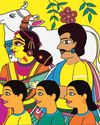
Nishtha Madan was diagnosed with thalassaemia when she was seven months old. "I wanted to overcome the limitations attached with the disease," says Madan, now 35, and a special educator and development psychologist with the department of education, Delhi. "The credit of keeping me healthy goes to my parents. When I became an adult, I started trying to make myself more aware of the disease."
Thalassaemia is a genetic blood disorder characterised by the reduced production of haemoglobin, the protein in red blood cells that carries oxygen throughout the body. It results in anaemia and can lead to severe health complications. Official figures say that there are nearly one lakh thalassaemia patients in India, with 10,000-15,000 new cases reported annually.
The country has one of the highest prevalence rates in the world, with regions such as Punjab, Gujarat and parts of the northeast showing particularly high carrier rates. "The situation is pretty bad in peripheral areas where awareness is low," says Dr Piyasi Basu Thal, a thalassaemia-major patient herself. Thalassaemia-major, the most severe form of the disorder, requires regular (two-three weeks) blood transfusions to manage symptoms and prevent complications. "It is like we are sitting on a volcano all the time," says Namitha Kumar, 46, who was diagnosed when she was four.
While the psychological burden of thalassaemia is telling, the economic cost is also significant. "Although thalassaemia is listed as a disability, there is no benefit for the patients. The government needs to bring reservation in education and employment for thalassaemia patients," demands Madan.
Kumar, who has a PhD from the National Institute of Advanced Studies in Bengaluru, agrees. “Despite paying taxes, I get no financial support from the government,” says the academic who works with Opford, a platform for rare diseases. “I can afford health insurance but there are several others who cannot.”
Esta historia es de la edición October 06, 2024 de THE WEEK India.
Comience su prueba gratuita de Magzter GOLD de 7 días para acceder a miles de historias premium seleccionadas y a más de 9,000 revistas y periódicos.
Ya eres suscriptor ? Conectar
Esta historia es de la edición October 06, 2024 de THE WEEK India.
Comience su prueba gratuita de Magzter GOLD de 7 días para acceder a miles de historias premium seleccionadas y a más de 9,000 revistas y periódicos.
Ya eres suscriptor? Conectar

The day of the knuckle-duster
Several narratives have emerged from the Donald Trump-Volodymyr Zelensky-J.D. Vance dust-up in the Oval office, the most disturbing being the opinion that “Zelensky invited it”.

The AGI dilemma
Spooky and powerful, AGI (Artificial General Intelligence), the planet’s newest technology, has divine benefits, as also diabolical applications that can trigger our destruction.

I want to transform MP into a powerhouse of development
GIS 2025 surpassed expectations in investment commitments, participation, and policy impact.

It is not NEP 2020, it is RSS 2020
TAMIL NADU’S RESISTANCE to the three-language policy under the National Education Policy (NEP) 2020 has reignited the debate over linguistic identity.

Munde blues
Just months into its tenure, the Fadnavis government suffers multiple blows

Plastic buckets and parliament seats
The plastics industry boomed in the 1970s when our rulers told our people to make fewer babies. The dairy industry, already on a high milkmark, should boom if Telugu Desam MP Kalisetti Appalanaidu gets people to make more babies. What’s the connection? Hold on. First listen to India’s population story that’s already a statistical farce, and may soon be a political tragedy.

MDGA-Make Diplomacy Great Again
Must say that all the reports of 'Agent Krasnov' make fascinating reading—like one of those old school, thick-as-a-brick bestsellers that Irving Wallace and Robert Ludlum used to write.

In search of Pampa
Salman Rushdie breathes life to the forgotten goddess Pampa Devi in his novel Victory City (2023).

Centre of attraction
If the enthusiasm at the Global Investors Summit is anything to go by, Madhya Pradesh is poised to write a new chapter of development

RO AND BEHOLD!
As the Champions Trophy win showed, the Rohit Sharma-led veteran brigade might not be over the hill. However, they will have to be on their toes as age and younger talent catch up